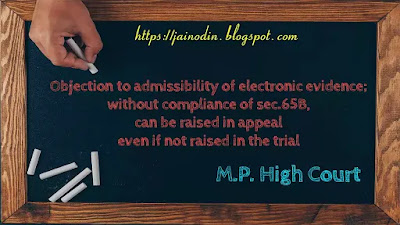Whats is the difference between objection to admissibility of document and objection to mode of proof?
What are its consequences?
If electronic evidence is admitted and exhibited in evidence then its admissibility can be raised in appeal even if it is not objected in the trial.
What are its consequences?
If electronic evidence is admitted and exhibited in evidence then its admissibility can be raised in appeal even if it is not objected in the trial.
Ordinarily, an objection to the admissibility of evidence should be taken when it is tendered and not subsequently.The objections as to admissibility of documents in evidence may be classified into two classes: (i) an objection that the document which is sought to be proved is itself inadmissible in evidence; and (ii) where the objection does not dispute the admissibility of the document in evidence but is directed towards the mode of proof alleging the same to be irregular or insufficient. In the first case, merely because a document has been marked as 'an exhibit', an objection as to its admissibility is not excluded and is available to be raised even at a later stage or even in appeal or revision. In the latter case, the objection should be taken when the evidence is tendered and once the document has been admitted in evidence and marked as an exhibit, the objection that it should not have been admitted in evidence or that the mode adopted for proving the document is irregular cannot be allowed to be raised at any stage subsequent to the marking of the document as an exhibit. The latter proposition is a rule of fair play. The crucial test is whether an objection, if taken at the appropriate point of time, would have enabled the party tendering the evidence to cure the defect and resort to such mode of proof as would be regular. The omission to object becomes fatal because by his failure the party entitled to object allows the party tendering the evidence to act on an assumption that the opposite party is not serious about the mode of proof. On the other hand, a prompt objection does not prejudice the party tendering the evidence, for two reasons: firstly, it enables the court to apply its mind and pronounce its decision on the question of admissibility then and there; and secondly, in the event of finding of the court on the mode of proof sought to be adopted going against the party tendering the evidence, the opportunity of seeking indulgence of the court for permitting a regular mode or method of proof and thereby removing the objection raised by the opposite party, is available to the party leading the evidence. Such practice and procedure is fair to both the parties. Out of the two types of objections, referred to hereinabove, in the latter case, failure to raise a prompt and timely objection amounts to waiver of the necessity for insisting on formal proof of a document, the document itself which is sought to be proved being admissible in evidence. In the first case, acquiescence would be no bar to raising the objection in a superior court.[Para No.22]
Thus, it is clear that where the mode of proof was irregular or insufficient and where the document is already marked as exhibit, then the objection with regard to its mode of proof cannot be raised at a later stage, however, where the document itself is not admissible, then it has to be excluded though it might have been brought without any objection. [Para No.23]
It is clear that the electronic document without accompanied by a certificate under Section 65-B of Evidence Act is not admissible in law.[Para No.25]
The secondary evidence in form of printed copy of call details relating to the mobile phones seized from the appellant/accused persons is not accompanied by the certificate in terms of Section 65B obtained at the time of taking the documents, without which, the secondary evidence pertaining to the electronic record, is inadmissible.[Para No
20]
Madhya Pradesh High Court
Vijay
Vs.
The State Of Madhya Pradesh
Drcided on 29/05/2020

